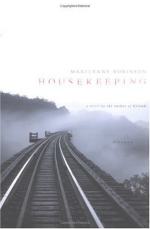|
This section contains 5,057 words (approx. 17 pages at 300 words per page) |

|
SOURCE: Mallon, Anne-Marie. “Sojourning Women: Homelessness and Transcendence in Housekeeping.” Critique 30, no. 2 (winter 1989): 95-105.
In the following essay, Mallon explores the significance of the biblical allusions in Housekeeping, asserting that the novel utilizes homelessness as a metaphor for transcendence.
When Marilynne Robinson opens her novel Housekeeping with the image of a “spectacular derailment” that sends a sleek, black train plunging into the depths of a lake, thereby abruptly widowing three women in the fictional town of Fingerbone, she is signaling her reader to expect the unexpected in what lies ahead. Surfaces will be shattered in this narrative; circles will be broken; and the lives of the Foster women will be marked from generation to generation by strange disasters and perilous departures. Of such a remarkable history must come extraordinary perceptions and uncommon choices. Robinson's women will not be contained within customary frames nor distracted by conventional stories of...
|
This section contains 5,057 words (approx. 17 pages at 300 words per page) |

|


